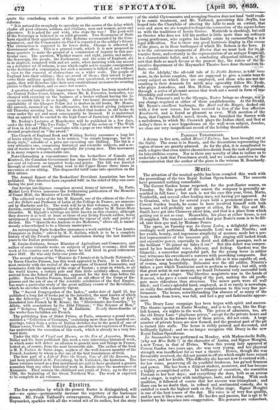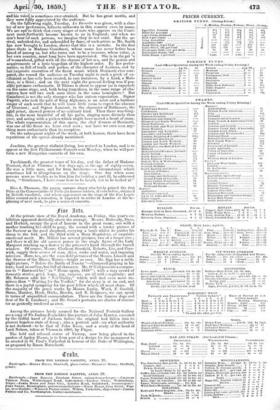The attention of the musical public has been occupied this
week with the proceedings of the two Royal Italian Opera-houses. The concerts have presented nothing remarkable. The Covent Garden house reopened, for the post-Easter season, on Tuesday. By this period of the season the company is generally as- sembled in full force ; but such is not the case this year, Grisi, Mario Tnmberlik, and several other leading stars, not having yet appeared. Af: to Graziani, who has for several years held a prominent place on the
Covent Garden boards, he seems to have involved himself with both houses, and will probably not appear at either, for Mr. Gye and Mr. Smith have got into Chancery about him, and that is a place from which
getting out is not so easy. Meanwhile, his place at either house, is not ill supplied. The rumour is confirmed that poor Bosio's room is to be fill- ed, taut bien que mal, by Madame Penco. The opera on Tuesday was La Gaza Ladra, a delightful piece, ex- ceedingly well performed. Mademoiselle Lotti was the Ninetta ; and
her youth, beauty, and ingenuous simplicity of manner, made her a per- fect representative of the innocent girL Her singing still lacked finish and executive power, especially in florid and difficult passages, such as the brilliant " Di piacer mi baize it cor." But this defect was compen- sated by her beautiful voice, delicacy, and feeling. Gardoni was the Gianetto ; a somewhat ungrateful part, for the young lover (a soldier too) witnesses his sweetheart's sorrows,with provoking composure. But Gardoni threw into the character as much life as it was capable of, and, of course, sang beautifully. Debassini was the old soldier, Ninetta's father, a part which Tamburini used to perform so finely ; but still, with
that great artist in our memory, we found Debassini very successful both as an actor and a singer. The libertine magistrate was in the hands of
Ronconi, who gave a comic reading of the part, making the old profli- gate more ridiculous than atrocious. The minor parts were all well filled ; and Costa's splendid band, employed, as it so rarely is nowadays, on really fine orchestral music, gave completeness to this very fine per- formance. The house, notwithstanding the absence of so many of the beau monde from town, was full, and had a gay and fashionable appear- ance.
The Drury Lane campaign has been begun with spirit and success. The theatre opened on Easter Monday, and is to be open, like the Eng- lish houses, six nights in the week. The prices of admission, too, are the old Drury Lane "playhouse prices," except for the private boxes and stalls, which in the former days of those prices, did not exist. A large number of private boxes are now formed, and the greatest part of the pit is turned into stalls. The house is richly painted and decorated, and brilliantly lighted; and we no longer recognize Old Drury in the new Royal Italian Operahouse.
La Sonnambula was performed on Monday, with Mademoiselle Balfe, (why not Miss Balfe ?) in the character of Amina, and Signor Mongini, a new Tenor, in that of Elvino. When this young lady appeared at
Covent Garden two years ago, she was very young, and her physical strength was insufficient for so vast a theatre. Hence, though she was favourably received, she did not persist in effitrts which might have ruined her voice, and her health. This difficulty she has not now to contend with; for her voice, preserving all its youthful freshness, has ga'ned firmness and power. She has been a diligent student, moreover, and has become a highly accomplished artist. In brilliancy of execution, she resembles Persiant in her best days ; and everything she does, both as an actress and a singer, is replete with intelligence, taste, and feeling. With such
qualities, it followed of course that her success was triumphant; and there can be no doubt that, in refined and sentimental comedy, she is
entitled to reach the highest rank on the Italian stage. Signor Mongini is one of the best tenors of the day. His voice is of very fine quality, and be uses it like a true artist. He has fire and passion, but is apt to be hurried by his impulses into exaggeration. His gestures are redundant,
and his voi is sometimes over-strained. But he has great merits, and they were fi y appreciated by the audience. On the f oaring night, Tuesday, La Favorite was given, with a clus- ter of new rformers, hitherto unknown in this country even by name. We are ap to think that every singer of note who appears on the Conti- nent museforthwith become known to us in England ; and when we
..
don't hear of such persons, we imagine they do not exist. But the ar- rival, nnlo ked-for, and unheralded by fame, of such artists as Mr. Smith has now rought to London, shows that this is a mistake. In the first place theie is Madame Guarducci, whose name has never before been heard of iliong us, but who turns out to be a treasure, whose value, .n her own country, must long have been appreciated. She is in the pri 1e orwomahhood, gifted with all the charms of her sex, and the genius and aecnirements of a lyric tragedian of the highest order. By her perfor- ms#te, 'so full of truth and pathos, of the character of Leonora, and by heiixquisite execution of the finest music which Donizetti ever com- pcised, she roused the audience on Tuesday night to such a pitch of ex- citement as has only been created, in rare instances, by a Lind, a Mali- bran, or a Grisi ; and on the next night the general feeling was if pos- silijo yets);aore enthusiastic. If Titiens is about to appear (as is expected) on, the same stage, and, both being tragedians, in the same range of cha- rstAtO-s,low will two such suns shine in the same hemisphere ? But atiarelucci is not the only stranger who has outrun expectation. Signor Ftgtitti, who took the part of King Alphonse, is an actor and a baritone singer of such merit that he will leave little room to regret the absence of graziani ; and Signor Lanzoni, in the character of Baldassare, the ado priest, showed powers of no ordinary kind. Then there was Giug- lini, in the most beautiful of all his parts, singing more divinely than ever, and acting with a pathos which might have moved a heart of stone. The whole representation of this opera, the chef d'ouvre of Donizetti, was one of the finest we have ever seen ; nor have we ever seen any- thing more enthusiastic than its reception.
On the subsequent nights of the week, at both houses, there have been repetitions of the operas already mentioned.



























 Previous page
Previous page